ROUTLEDGE LIBRARY EDITIONS: JAPAN
MASTERPIECES OF CHIKAMATSU
MASTERPIECES OF CHIKAMATSU
The Japanese Shakespeare
Translated by
ASATARO MIYAMORI
Revised by
ROBERT NICHOLS
Volume 58

LONDON AND NEW YORK
First published in 1926
This edition first published in 2011
by Routledge
2 Park Square, Milton Park, Abingdon, Oxon, OX14 4RN
Simultaneously published in the USA and Canada
by Routledge
270 Madison Avenue, New York, NY 10016
Routledge is an imprint of the Taylor & Francis Group, an informa business
This edition published in the Taylor & Francis e-Library, 2010.
To purchase your own copy of this or any of Taylor & Francis or Routledges collection of thousands of eBooks please go to www.eBookstore.tandf.co.uk.
1926 Kegan Paul, Trench, Trbner & Co., Ltd.
All rights reserved. No part of this book may be reprinted or reproduced or utilised in any form or by any electronic, mechanical, or other means, now known or hereafter invented, including photocopying and recording, or in any information storage or retrieval system, without permission in writing from the publishers.
British Library Cataloguing in Publication Data
A catalogue record for this book is available from the British Library
ISBN 0-203-84352-5 Master e-book ISBN
ISBN 13: 978-0-415-56498-4 (Set)
eISBN 13: 978-0-203-84317-8 (Set)
ISBN 13: 978-0-415-59122-5 (Volume 58)
eISBN 13: 978-0-203-84352-9 (Volume 58)
Publishers Note
The publisher has gone to great lengths to ensure the quality of this reprint but points out that some imperfections in the original copies may be apparent.
Disclaimer
The publisher has made every effort to trace copyright holders and would welcome correspondence from those they have been unable to trace.
MASTERPIECES OF CHIKAMATSU
THE JAPANESE SHAKESPEARE
TRANSLATED BY
ASATARO MIYAMORI
Professor of English Literature in The Oriental University, Tokyo
REVISED BY
ROBERT NICHOLS
Formerly Professor of English Literature in The Imperial University, Tokyo Wttb
74 Illustrattons

THE YAMATO SOCIETY
TOKYO
LONDON
KEGAN PAUL, TRENCH, TRUBNER & CO., LTD.
NEW YORK: E.P.DUTTON & CO.
1926
PREFACE
WITH the exception of The Tethered Steed, the following are unabridged translations of the best j ruri (puppet plays) of Chikamatsu Monzamon, known as The Japanese Shakespeare. All episodical details are omitted from The Tethered Steed, and passages consisting of words, words, words, have been very much condensed, so that the play as it is now offered to the reader is less than half the length of the original. With regard to the other plays, the translation has been invariably made with such conscientious fidelity as is consistent with clarity. It must be borne in mind, however, that certain narrative elements and, in particular, the michiyuki or songs of travel, which abound in classical quotations, similes, metaphors and above all in the most exquisite word-play, offer almost insuperable obstacles even to the hand of a mastertranslator. Where such difficulties are encountered any attempt at literal translation is of necessity abandoned and I have endeavoured to convey the general sense in my own phraseology. This unavoidable paraphrasing is the more unfortunate in that half the special significance and grace of Chikamatsu is to be found in these very passages, written in excellent verse and displaying to the fullest advantage the beauty and music of the Japanese tongue.
ruri (puppet plays) of Chikamatsu Monzamon, known as The Japanese Shakespeare. All episodical details are omitted from The Tethered Steed, and passages consisting of words, words, words, have been very much condensed, so that the play as it is now offered to the reader is less than half the length of the original. With regard to the other plays, the translation has been invariably made with such conscientious fidelity as is consistent with clarity. It must be borne in mind, however, that certain narrative elements and, in particular, the michiyuki or songs of travel, which abound in classical quotations, similes, metaphors and above all in the most exquisite word-play, offer almost insuperable obstacles even to the hand of a mastertranslator. Where such difficulties are encountered any attempt at literal translation is of necessity abandoned and I have endeavoured to convey the general sense in my own phraseology. This unavoidable paraphrasing is the more unfortunate in that half the special significance and grace of Chikamatsu is to be found in these very passages, written in excellent verse and displaying to the fullest advantage the beauty and music of the Japanese tongue.
Sometimes for the sake of euphony the poet sacrifices sense to sound and is content to remain inconsistent, a tendency which it is not hypercritical to regret. An illustration of the weakness is to be found in The Love Suicide at Amijima, where in the first act the hero is spoken of as being in narrow circumstances, while at the beginning of the second act, the audience is given to understand that the heros business is in a thriving condition. I have given myself a free hand in rendering such contradictory information and avoiding such discrepancies.
The reader would do well, moreover, to remember that these selections are puppet plays intended to be chanted by professional reciters to the music of the samisen, the finest of all Japanese instruments, and to be performed by beautiful marionettes, skilfully manipulated; let him reflect that puppetry is a synthetic art in which dialogue, poetry, music, song and the motion of marionettes all combine. True and perfect appreciation of Chikamatsu, therefore, is not to be gained by a mere reading of the texts; even less is it reached by a reading of any translation of them. It may assist the readers imagination to notice that to impart life and animation to the puppets demands a certain exaggeration in the action, a leaven of bombast in the language throughout the piece.
Throughout this volume, in the case of personal names of Old Japan the surname precedes the given name (equivalent to Christian name), while with present-day names the position is reversed. The reason for such an arrangement is that in olden times given names were the more important; to-day, as happens with European names, the surname is of the greater importance. Again, many names used in olden times occur to ones mind, of which it is absolutely impossible to write the given name first. Let me instance the name Taira-no-Shigmori, which cannot be written Shigmori Taira, since the surname Taira is always followed by the postposition n . I enlarge on this somewhat trifling matter because a reviewer in an American magazine, in the course of his notice of my Tales from Old Japanese Dramas, laid upon me the reproach of an apparent inconsistency. The titles of many .Japanese classic dramas are, for a reason into which it would be inconvenient to enquire here, both long and quaint, and consequently are among the troubles of the translator. I have thought it helpful to translate some of these old superscriptions very literally in the course of my introduction, that the reader may more easily identify the plays by means of the original titles, clumsy though the titles may sound.
. I enlarge on this somewhat trifling matter because a reviewer in an American magazine, in the course of his notice of my Tales from Old Japanese Dramas, laid upon me the reproach of an apparent inconsistency. The titles of many .Japanese classic dramas are, for a reason into which it would be inconvenient to enquire here, both long and quaint, and consequently are among the troubles of the translator. I have thought it helpful to translate some of these old superscriptions very literally in the course of my introduction, that the reader may more easily identify the plays by means of the original titles, clumsy though the titles may sound.
My hearty thanks are due to Mr. Kid Okamoto, Mr. Yontar
Okamoto, Mr. Yontar Matsuyama, Mr. Seitar
Matsuyama, Mr. Seitar Atsumi, Dr. Tsukuru Fujimura, Dr. Mankichi Wada, Mr. Sabur
Atsumi, Dr. Tsukuru Fujimura, Dr. Mankichi Wada, Mr. Sabur Sakamoto and Mr. Kais
Sakamoto and Mr. Kais Nonomura, all of whom gave me valuable suggestions. I am also under obligation to Mr. H
Nonomura, all of whom gave me valuable suggestions. I am also under obligation to Mr. H gin Kidani, who kindly supplied me with a few photographs and further granted me ready permission to avail myself freely of his Comments on Chikamatsus Complete Works.
gin Kidani, who kindly supplied me with a few photographs and further granted me ready permission to avail myself freely of his Comments on Chikamatsus Complete Works.
ASATARO MIYAMORI.
Tokyo.
A LETTER FROM DOCTOR SH

Y


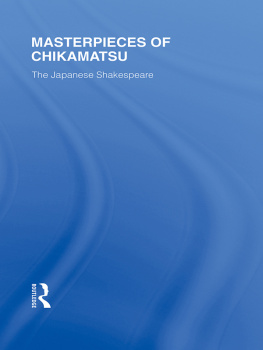
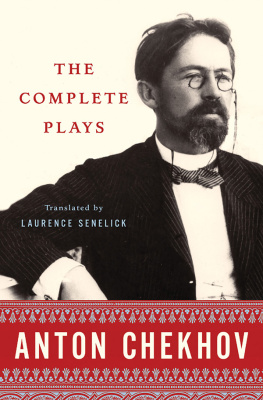
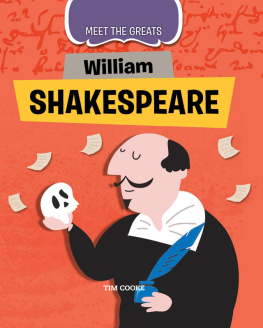
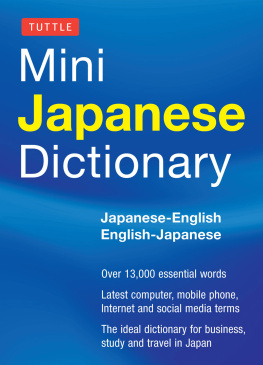
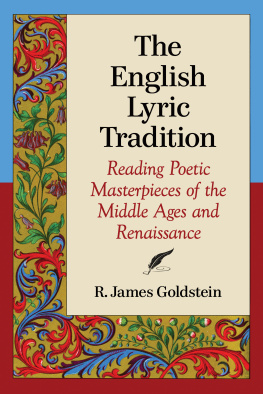
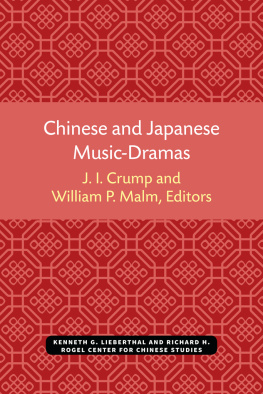
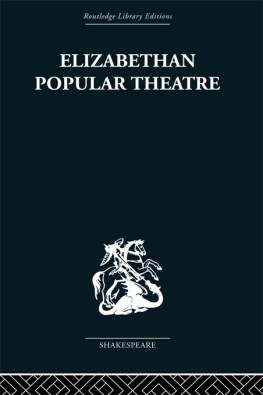
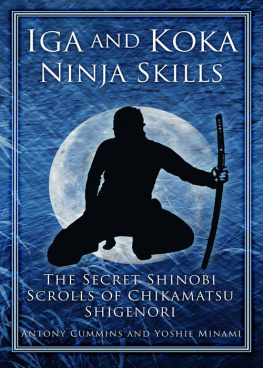
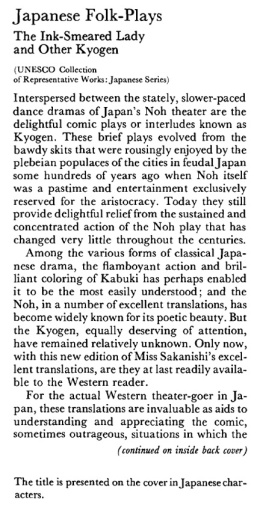
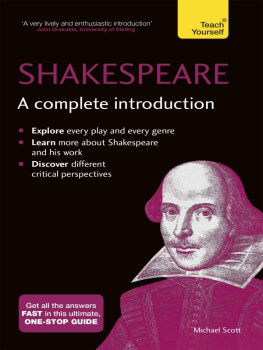
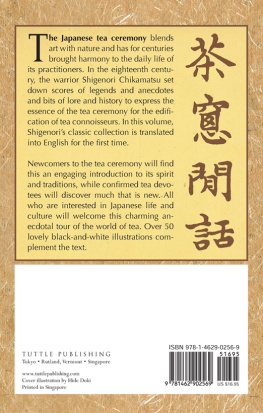
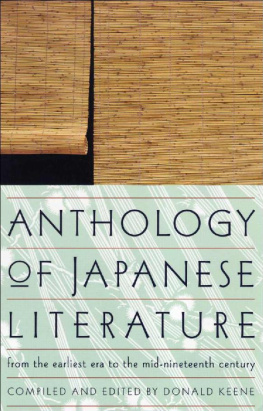
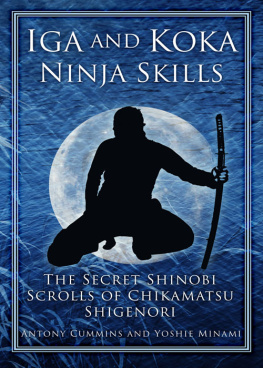


 ruri (puppet plays) of Chikamatsu Monzamon, known as The Japanese Shakespeare. All episodical details are omitted from The Tethered Steed, and passages consisting of words, words, words, have been very much condensed, so that the play as it is now offered to the reader is less than half the length of the original. With regard to the other plays, the translation has been invariably made with such conscientious fidelity as is consistent with clarity. It must be borne in mind, however, that certain narrative elements and, in particular, the michiyuki or songs of travel, which abound in classical quotations, similes, metaphors and above all in the most exquisite word-play, offer almost insuperable obstacles even to the hand of a mastertranslator. Where such difficulties are encountered any attempt at literal translation is of necessity abandoned and I have endeavoured to convey the general sense in my own phraseology. This unavoidable paraphrasing is the more unfortunate in that half the special significance and grace of Chikamatsu is to be found in these very passages, written in excellent verse and displaying to the fullest advantage the beauty and music of the Japanese tongue.
ruri (puppet plays) of Chikamatsu Monzamon, known as The Japanese Shakespeare. All episodical details are omitted from The Tethered Steed, and passages consisting of words, words, words, have been very much condensed, so that the play as it is now offered to the reader is less than half the length of the original. With regard to the other plays, the translation has been invariably made with such conscientious fidelity as is consistent with clarity. It must be borne in mind, however, that certain narrative elements and, in particular, the michiyuki or songs of travel, which abound in classical quotations, similes, metaphors and above all in the most exquisite word-play, offer almost insuperable obstacles even to the hand of a mastertranslator. Where such difficulties are encountered any attempt at literal translation is of necessity abandoned and I have endeavoured to convey the general sense in my own phraseology. This unavoidable paraphrasing is the more unfortunate in that half the special significance and grace of Chikamatsu is to be found in these very passages, written in excellent verse and displaying to the fullest advantage the beauty and music of the Japanese tongue. . I enlarge on this somewhat trifling matter because a reviewer in an American magazine, in the course of his notice of my Tales from Old Japanese Dramas, laid upon me the reproach of an apparent inconsistency. The titles of many .Japanese classic dramas are, for a reason into which it would be inconvenient to enquire here, both long and quaint, and consequently are among the troubles of the translator. I have thought it helpful to translate some of these old superscriptions very literally in the course of my introduction, that the reader may more easily identify the plays by means of the original titles, clumsy though the titles may sound.
. I enlarge on this somewhat trifling matter because a reviewer in an American magazine, in the course of his notice of my Tales from Old Japanese Dramas, laid upon me the reproach of an apparent inconsistency. The titles of many .Japanese classic dramas are, for a reason into which it would be inconvenient to enquire here, both long and quaint, and consequently are among the troubles of the translator. I have thought it helpful to translate some of these old superscriptions very literally in the course of my introduction, that the reader may more easily identify the plays by means of the original titles, clumsy though the titles may sound. Y
Y